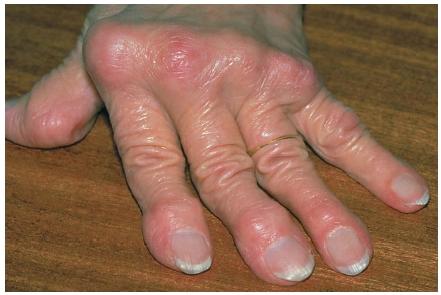Obesity and Psoriasis | Higher BMI Greater Risk of Psoriatic Arthritis

Study Shows Higher BMI Leads to Increased Risk of PsA
Research from a general population study of data, from The Health Improvement Network, suggests an increased risk of psoriatic arthritis among those who suffer from obesity. The data compiled between 1995 and 2010 is representative of the general population of the UK. The study was led by Thorvadur Jon Love of Landspitale University Hospital in Icland, and his colleagues, which confirmed an increase in BMI (body mass index) shows a direct connection to the increased risk of psoriatic arthritis (PsA). Sounds like a great reason to loose weight and reduce your BMI.
What is Psoriatic Arthritis (PsA)
Psoriatic arthritis is a particularly aggressive and potentially destructive, inflammatory arthritis. IPsA is an autoimmune disease, so one's own cells and antibodies attack their own tissues. It can strike at any age but is most prevalent in patients between 30 and 55. Due to its aggressive nature, left untreated PsA will often cause permanent joint damage. Psoriatic arthritis affects approximately 15% of people with psoriasis and is rarely seen in a person that does not have obvious psoriasis. Often the more severe the psoriasis the more severe the PsA. Psoriasis is more common, and often more severe, in those that suffer from obesity.
Do You Suffer?
Do You Suffer From Obesity, Psoriasis, or Psoriatic Arthritis
The Statistics Comparing Obesity and Psoriatic Arthritis
Study of Psoriasis Suffers
- 75,395 men and women at a mean of 52 years
- 976 developed psoriatic arthritis (PsA)
- As compared with those with normal body weight:
- Those that were overweight were 9% more likely to develop PsA
- Those that had obesity were 22% more likely to develop psoriatic arthritis
- Those who were morbidly obese were 44% more likely to develop the disorder
Study of the General Population
- 2 million people with or without psoriasis
- As compared to those with normal body weight:
- Those who were overweight were 17% more likely to develop PsA
- Those who had obesity were 57% more likely to develop psoriatic arthritis
- Those who were morbidly obese were 96% more likely to develop the disorder.
BMI Interpretations for This Study
- Overweight defined as BMI of 25.0 to 29.9 kg/m2
- Obesity defined as 30 to 34.9 kg/m2
- Morbidly obese as 35 or greater kg/m2

Obesity at a Younger Age Increases Risk Further
It is interesting that among the general public there is nearly double the risk of getting psoriatic arthritis for those overweight and obese as opposed to the study of patients that all had psoriasis. The reason may be in large part because those that are obese are much more likely to develop psoriasis. Especially those that develop obesity at a younger age. One study suggests that patients who report having been obese at the age of 18 are 300% more likely to develop PsA than those with a normal BMI ate 18 years of age.
What Came First: The Obesity or The Psoriasis
It is unclear if one (obesity or psoriasis) causes the other. Some researchers believe that psoriasis and psoriatic arthritis can contribute to obesity. This may be because the increased pain makes exercise less likely. Some suggest the increased rate of depression in psoriasis sufferers may also contribute to less exercise. Some believe certain hormones, like the protein leptin, found in higher levels in obese people may contribute to being prone to psoriasis. Perhaps it may be common genes that make one more likely to develop obesity and psoriasis. Both conditions do in fact involve chronic inflammation which also may help one cause the other. One may not cause the other, but may just reinforce the other. It could be that psoriasis and psoriatic arthritic contribute to increased body weight and an increased body weight and BMI increase the likelihood of psoriatic arthritis and psoriasis. The actual research is less conclusive than the anecdotal theories.
Treatment Is Not an Option, It is Vital!
What is clear is that obesity or a high body mass index (BMI) and psoriasis seem to go hand in hand, and both can lead to psoriatic arthritis. If one can cause the other, or at least increase the likelihood of the other, it stands to reason that you should treat either condition you may have. This may help reduce the risk you have condition developing further limiting the recovery of the first disorder. Don't be another statistic, decide to be an individual and take responsibility for your health and well being.
Helpful Links for Psoriasis Sufferers
- Natural Scalp Psoriasis Treatment | Tea Tree Oil and Olive Oil
Scalp Psoriasis can be remedied with natural treatments. One way to help relieve psoriasis of the scalp is with a tea tree and olive oil treatment that you massage onto your head and leave for about an hour. This article has a description and step-by - Homeopathic Topical Psoriasis Remedy - Witch Hazel and Glycerin USP
Witch Hazel and Glycerin USP together provide a great natural treatment for psoriasis. They are also beneficial to soothing skin conditions of all kinds. Help treat psoriasis naturally with Glycerin USP and Witch Hazel. - Psoriasis, Obesity, and Heart Disease
Psoriasis, a chronic and recurring inflammatory condition of the skin, has been linked to an increased incidence of obesity, heart disease, strokes and other cardiovascular problems.






